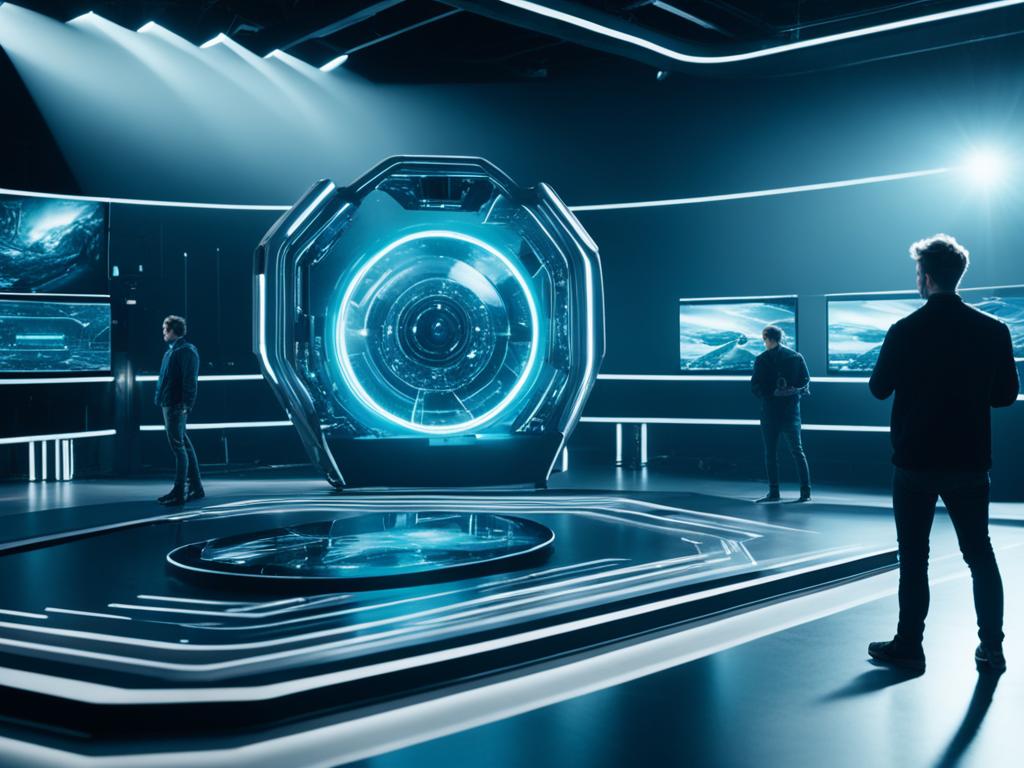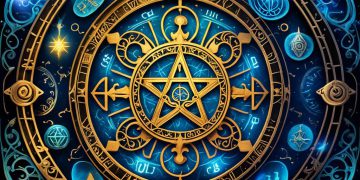Artificial intelligence (AI) is revolutionizing the world of film and TV production, reshaping the way stories are told and content is created. From scriptwriting to post-production processes, AI is making its mark in pop culture. Let’s explore how AI is transforming the industry and revolutionizing storytelling.
With the advancement of AI technology, filmmakers and TV producers have access to powerful tools that can generate innovative narratives and characters. AI is revolutionizing storytelling techniques, pushing the boundaries of imagination and creativity. It offers the ability to analyze vast amounts of data, identify patterns, and generate fresh ideas that captivate audiences.
But it doesn’t stop there. AI is also playing a significant role in post-production processes, such as film editing, visual effects, and sound design. By leveraging AI algorithms, editors and designers can enhance efficiency, improve the quality of their work, and explore new creative possibilities.
Key Takeaways:
- AI is revolutionizing storytelling techniques and pushing the boundaries of creativity in film and TV production.
- AI is transforming post-production processes, such as film editing, visual effects, and sound design.
- Filmmakers and TV producers have access to powerful tools that can analyze data and generate fresh ideas.
- AI enhances efficiency, improves quality, and opens up new creative possibilities in the industry.
- From scriptwriting to post-production, AI is reshaping the way stories are told and content is created.
Revolutionizing Storytelling with Artificial Intelligence
In the ever-evolving landscape of popculture, artificial intelligence (AI) is making a profound impact on various industries. In the realm of film and TV, AI is revolutionizing storytelling techniques, ushering in a new era of innovation and creativity.
Scriptwriting, the foundation of any great production, has been greatly influenced by AI. AI in scriptwriting has the potential to generate groundbreaking narratives, pushing the boundaries of storytelling. By analyzing vast amounts of data from existing scripts, AI algorithms can identify patterns, tropes, and character archetypes to assist writers in crafting captivating stories.
AI is not limited to just writing scripts; it is also shaping the way content is created. AI in content creation streamlines the creative process by analyzing audience preferences, market trends, and cultural influences. This allows content creators to generate ideas that resonate with viewers, increasing the likelihood of creating successful and engaging content.
One remarkable aspect of AI in content creation is its ability to create realistic and compelling characters. By analyzing vast databases of existing characters, AI algorithms can identify common traits, characteristics, and dialogue patterns. This data-driven approach empowers content creators to develop unique and multidimensional characters that audiences can connect with on a deeper level.
With AI technology, filmmakers and scriptwriters now have a powerful tool at their disposal to enhance their storytelling abilities, creating narratives that captivate and inspire. AI in scriptwriting and content creation is not replacing human creativity, but rather augmenting it, offering a wealth of information and insights to fuel imagination and spark new ideas.
AI has the potential to reshape the future of film and TV production, enabling creators to experiment with new storytelling techniques, generate fresh ideas, and engage audiences in unprecedented ways. As this technology continues to evolve, we can expect AI to become an integral part of the creative process, enhancing rather than replacing the human touch.
The Power of AI in Scriptwriting and Content Creation
The integration of AI in scriptwriting and content creation presents a myriad of opportunities for filmmakers and content creators. Here are some key benefits:
- Efficiency: AI algorithms can quickly analyze vast amounts of data and generate insights, saving time and effort in the writing process.
- Innovation: AI can spark creativity by offering alternative perspectives, suggesting unique plot twists, and creating distinct characters that defy traditional conventions.
- Market Relevance: AI-powered content creation can analyze audience preferences and trends, helping creators develop content that aligns with viewer interests.
- Diverse Representation: AI algorithms can identify and address biases in storytelling, leading to more inclusive narratives and diverse representation on screen.
Case Study: AI in Scriptwriting
One notable example of AI in scriptwriting is the collaboration between IBM Watson and the production company Elemental Content. Together, they created a short film titled “2.0” which was entirely generated by AI. The AI analyzed hundreds of horror movie trailers and fed the data to Watson, who then wrote the script. The result was a suspenseful and captivating narrative that showcased the potential of AI in shaping storytelling.
| Benefits of AI in Scriptwriting and Content Creation: | Examples: |
|---|---|
| Efficiency | AI algorithms can quickly analyze vast amounts of data and generate insights, saving time and effort in the writing process. |
| Innovation | AI can spark creativity by offering alternative perspectives, suggesting unique plot twists, and creating distinct characters that defy traditional conventions. |
| Market Relevance | AI-powered content creation can analyze audience preferences and trends, helping creators develop content that aligns with viewer interests. |
| Diverse Representation | AI algorithms can identify and address biases in storytelling, leading to more inclusive narratives and diverse representation on screen. |
As we continue to explore the possibilities of AI in popculture, it is crucial to strike a balance between technological advancements and the human creative touch. Embracing AI as a powerful tool in the storytelling process can unleash new potentials, enabling filmmakers and content creators to captivate audiences in ways never imagined before.
The Role of AI in Post-Production
In the fast-paced world of film and TV production, every second counts. That’s why the integration of Artificial Intelligence (AI) in post-production processes has been a game-changer. AI technologies are revolutionizing film editing, visual effects, and sound design, enhancing efficiency, quality, and creative possibilities across the board.
Film editing is a critical component of the post-production phase. Traditionally, it involved meticulous manual work, sorting through hours of footage to select the best takes and create a cohesive narrative. However, with AI in the picture, the process has become more streamlined and efficient. AI systems can analyze data such as facial expressions, emotions, and audio cues to identify key moments and automatically assemble a rough cut. This not only saves time but also provides editors with a starting point for refining the story.
The use of AI extends beyond basic editing tasks. AI algorithms can analyze and suggest edits based on pacing, visual flow, and storytelling conventions. This allows editors to experiment with different options quickly and explore new creative avenues. Furthermore, AI can automate repetitive tasks, such as color grading and visual effects application, speeding up the post-production process and enabling filmmakers to meet tight deadlines without sacrificing quality.
Visual effects play a crucial role in enhancing the visual appeal of a film or TV show. With AI, visual effects artists can take their craft to the next level. AI algorithms can learn from vast databases of existing visual effects and generate new effects that seamlessly blend into the footage. This not only saves time but also opens up endless possibilities for creating stunning and immersive visuals.
AI-powered tools can also assist in sound design, a vital element in creating an immersive audio experience. AI algorithms can analyze and classify sounds, automatically generating appropriate sound effects and ambience. Additionally, AI can enhance dialogue clarity, remove background noise, and even synthesize realistic voiceovers based on text input. These advancements empower sound designers to elevate the audio quality without spending excessive time on manual tasks.
The Impact of AI in Post-Production
“AI technology has transformed the post-production landscape, enabling us to work more efficiently and creatively. It has revolutionized the way we edit films, add visual effects, and enhance the audio experience. AI is not replacing humans; it is empowering us, giving us tools to excel in our craft and push the boundaries of what’s possible.”
As AI continues to evolve, it is poised to reshape post-production processes further. With advancements in machine learning and deepfake technology, AI has the potential to simulate realistic scenes and characters, creating entirely new possibilities for filmmakers.
The integration of AI in post-production is a testament to the power of technology in the entertainment industry. As filmmakers continue to explore the vast potential of AI, we can expect groundbreaking developments in film editing, visual effects, and sound design, ultimately enriching the viewer’s experience and propelling the realm of pop culture forward.
Ethical Considerations of AI in Creative Processes
As AI continues to shape the creative processes in film and TV production, ethical considerations arise that require careful examination. These considerations go beyond the technical advancements and delve into the responsible usage of AI in popculture.
Bias in AI-generated Content
One of the key ethical concerns revolves around the potential bias embedded within AI-generated content. While AI algorithms can assist in creating compelling narratives and characters, there is a risk that these algorithms may inadvertently perpetuate existing biases present in the data they are trained on. It is essential for filmmakers and content creators to be conscious of this issue and actively work towards developing inclusive and diverse AI models. By embracing diversity, we can ensure that AI in creative processes contributes positively to the representation of different cultures, backgrounds, and perspectives.
Intellectual Property Rights
The infringement of intellectual property rights is another pressing issue when it comes to AI in popculture. As AI algorithms analyze vast amounts of existing content to generate new ideas, there is a possibility of unintentional plagiarism or copyright violations. Content creators must be vigilant in ensuring that AI-generated content does not infringe upon the rights of other creators. Striking a balance between utilizing AI for creative inspiration while respecting intellectual property rights is crucial for maintaining ethical standards.
“As AI becomes more integrated into creative processes, it is essential that we address the ethical implications it brings. This means actively considering the biases that AI may introduce and taking steps to mitigate them, as well as ensuring that AI-generated content is original and respects the work of others.”
The Human Touch in Storytelling
While AI can deliver efficient and innovative content creation, it is important to recognize the irreplaceable human touch in storytelling. Genuine emotions, unique perspectives, and the ability to empathize with the audience are qualities that currently distinguish human-made stories from those generated purely by AI. Maintaining a balance between AI-assisted processes and human creativity is essential to preserve the artistry and authenticity that viewers appreciate.
Responsible AI Use
It is crucial for industry professionals to engage in critical discussions surrounding the responsible use of AI in creative processes. This involves setting ethical guidelines and implementing mechanisms to ensure the AI systems employed in popculture are transparent, accountable, and aligned with ethical principles. By fostering collaboration between AI experts, filmmakers, and audiences, we can collectively navigate the challenges and dilemmas that AI presents, elevating the overall quality and impact of AI-driven productions.
By addressing these ethical considerations, we pave the way for the responsible integration of AI in creative processes within the film and TV industry. Striking the right balance between ethical implementation, human creativity, and technical advancements ensures that AI in popculture continues to enhance storytelling while respecting the values and aspirations of the creative community and the viewers.
AI’s Contribution to Personalized Viewing Experiences
As AI continues to shape pop culture, its impact on personalized content and viewer recommendations cannot be overstated. Artificial intelligence algorithms are revolutionizing the way we consume film and TV by tailoring recommendations to individual tastes and preferences.
Imagine a streaming platform that understands your unique interests, genre preferences, and viewing habits. With AI in personalized content, this is becoming a reality. By analyzing your previous choices and comparing them to vast databases of user behavior, AI algorithms can predict what you’ll enjoy next with remarkable accuracy.
These AI-powered systems take various factors into account, including your past watch history, ratings, and even external data such as trends and popular content. By understanding your preferences on a deeper level, AI in viewer recommendation algorithms can present you with a curated list of must-watch shows and movies, tailored specifically to your taste.
“I never knew what to watch next until AI started recommending movies and TV shows based on my tastes. It’s like having my own personal entertainment curator!” – Emma J., avid streaming enthusiast
Moreover, AI in popculture has paved the way for personalized content beyond just recommendations. Streaming platforms like Netflix are utilizing AI to create dynamic artwork, thumbnails, and personalized posters, adapting the visual representation of a movie or TV show to align with individual preferences. This attention to detail enhances the overall viewing experience and draws viewers in by highlighting elements that resonate with their interests.
AI’s contribution to personalized viewing experiences extends beyond merely suggesting content. The technology is also being used to improve subtitles and translations, adjusting them to suit different language preferences and dialects. This ensures that viewers around the world can enjoy their favorite shows and movies in a language they are most comfortable with.
Benefits of AI in Personalized Viewing Experiences
| Benefit | Description |
|---|---|
| Accurate Recommendations | AI algorithms analyze user preferences and behavior to provide highly accurate content recommendations. |
| Enhanced Visual Appeal | AI-powered systems create personalized artwork, thumbnails, and posters to cater to individual interests. |
| Improved Subtitles and Translations | AI technology adjusts subtitles and translations based on language preferences, ensuring a seamless viewing experience for diverse audiences. |
With AI revolutionizing personalized viewing experiences, streaming platforms are able to deliver content that speaks directly to you. Whether it’s suggesting your next favorite show or customizing the visual presentation, AI is transforming the way we engage with film and TV.
Discover the power of AI in popculture and unlock a world of personalized content and recommendations. Experience film and TV like never before, as AI algorithms elevate your viewing journey.
Future Trends in AI-Driven Media Production
As technology continues to evolve, the future of AI in pop culture and media production holds great promise. Advancements in AI technology, such as machine learning and deepfake, are set to revolutionize the way films and TV shows are created, consumed, and experienced.
The seamless integration of AI into media production processes has the potential to streamline workflows, enhance creativity, and deliver personalized content. With AI algorithms becoming more sophisticated and efficient, we can expect to see an increased reliance on AI-driven technologies in the entertainment industry.
One significant future trend in AI-driven media production is the role of machine learning in content creation. Machine learning algorithms can analyze vast amounts of data, including audience preferences, trends, and historical patterns, to generate insights that shape storytelling and content development.
AI can assist in automating various tasks, such as script development, character creation, and plot analysis, thereby helping content creators brainstorm ideas and add depth to their narratives. By leveraging AI’s capabilities, creators can push the boundaries of imagination and explore new storytelling techniques.
Deepfake Technology in Media Production
Another noteworthy trend is the emergence of deepfake technology in media production. Deepfake algorithms use artificial intelligence to manipulate and alter audio and video content, creating hyper-realistic simulations that blur the line between reality and fiction.
While deepfake technology has gained attention for its potential misuse and ethical concerns, it also presents exciting opportunities for filmmakers and content creators. With deepfake technology, actors can be digitally “aged” or “de-aged,” allowing for seamless storytelling across different time periods. It also opens up possibilities for casting choices, as AI can convincingly simulate the appearance and performance of various actors.
AI-driven media production is reshaping the entertainment industry, pushing boundaries, and redefining what is possible. From revolutionizing content creation with machine learning to the innovative use of deepfake technology, AI’s influence on pop culture is only set to grow.
Examples of Future Trends in AI-Driven Media Production
| Trend | Description |
|---|---|
| Virtual Reality (VR) and Augmented Reality (AR) | AI-enhanced VR and AR technologies enable immersive storytelling experiences, bringing audiences closer to the action. |
| Real-Time Content Generation | AI algorithms can generate personalized content in real-time, tailoring the storytelling experience to each viewer. |
| AI-Assisted Post-Production | AI technology helps streamline post-production processes, including editing, visual effects, and color grading. |
| Automated Content Distribution | AI algorithms optimize content distribution strategies, ensuring the right content reaches the right audiences at the right time. |
The future of AI in media production is an exciting prospect. It holds immense potential for innovation, creativity, and personalized experiences. As AI continues to advance, its impact on pop culture and the entertainment industry will be profound, shaping the way we consume and engage with films and TV shows.
Conclusion
In this article, we have explored the significant impact of AI on film and TV production, showcasing how it has revolutionized storytelling and transformed the entire creative process. AI algorithms and technologies have brought a new level of innovation and efficiency to the industry, creating exciting opportunities for filmmakers, scriptwriters, and content creators.
Through AI, scriptwriting and content creation have become more dynamic and imaginative, generating innovative narratives and compelling characters. AI has also played a crucial role in post-production, enhancing film editing, visual effects, and sound design with its ability to streamline processes and enhance creative possibilities.
While AI has brought numerous benefits to the industry, ethical considerations cannot be overlooked. Challenges such as bias, infringement of intellectual property rights, and the need for the human touch in storytelling have prompted important discussions on responsible AI use.
Looking into the future, AI-driven media production is set to continue evolving and shaping the popculture landscape. Advancements in AI technology, such as machine learning and deepfake, will pave the way for exciting new trends in film and TV creation. Overall, AI’s integration into popculture has forever transformed the way films and TV shows are produced, offering limitless potential for creativity and viewer experiences.







